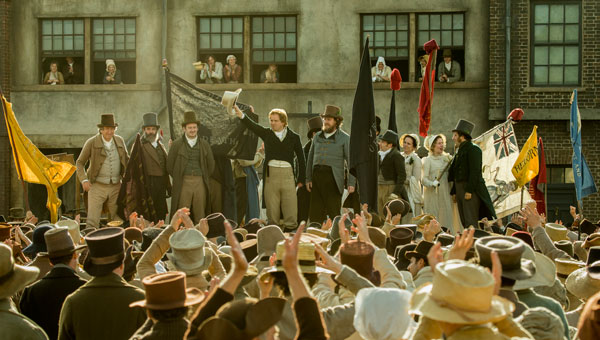Peterloo Review

Mike Leigh’s much-lauded Peterloo comes to the cinema this month, focussing on an important but seemingly neglected chapter in English history.
The story opens at the end of the Battle of Waterloo in 1815, recounting the arrivals home of two very different veterans.
In London, the Duke of Wellington’s victory is hotly discussed, as is his lofty remuneration. Up north, a young bugler makes the long journey by foot back to his family in Manchester.
Field Marshall John Byng is meanwhile called in by the Home Secretary and tasked with overseeing the north of the country, specifically Lancashire, due to growing unrest.
Through the eyes of the young bugler and his family we see the cause of the unrest during the post-war years: unemployment, scarcity of food and shrinking wages; sharply contrasted with the wealthy south.
These conditions lead to gatherings organised by the likes of John Knight, John Thacker Saxton and Samuel Bamford, calling for Parliamentary reform and an extension of voting rights to ultimately help bridge the economic gap between north and south.
This activity is monitored with concern by the local police and several magistrates, periodically reporting back to London.
The reformers eventually attract the attention of famed orator and democratic radicalist Henry Hunt, played by the reliably excellent Rory Kinnear.
A large gathering is planned for the 16th August 1819 in St Peter’s Fields, at which Hunt will speak and rally support. Tens of thousands of people plan to attend.
As anyone familiar with the tragic event will know, the police and armed militias attempt to arrest the event leaders onstage goes horribly wrong, resulting in the eponymous massacre.
Peterloo looks amazing; the beauty of the northern landscape at odds with the sadness of the human conflict.
Against this canvas are some rich performances. Alongside the likes of Kinnear, there are top supporting turns from Philip Whitchurch and Vincent Franklin as magistrates and Neil Bell as Samuel Bamford. Maxine Peake is great as Nellie but feels underused.
There are many other strong performances to mention; arguably an overabundance. There is no denying a dense historical backdrop here, but cinematically this does result in certain characters being built up and then disappearing midway through the film without explanation.
The plight of the reformers is handled in a sensitive but grounded way, yet is nearly undermined at times by the often caricatured depictions of some upper class and authority figures.
Alastair Mackenzie, Robert Wilfort and Karl Johnson are all suitably callous as the main political decision-makers, but Deputy Chief Constable Nadin looks like he has wandered in from a pantomime and Tim McInnerny’s performance recalls his various Blackadder roles.
On the whole, Leigh has crafted an explosive and necessarily verbose crescendo of a film, heartbreaking and incensing in equal measures, and makes the 200-year old events relevant for our times.
Conor Brennan